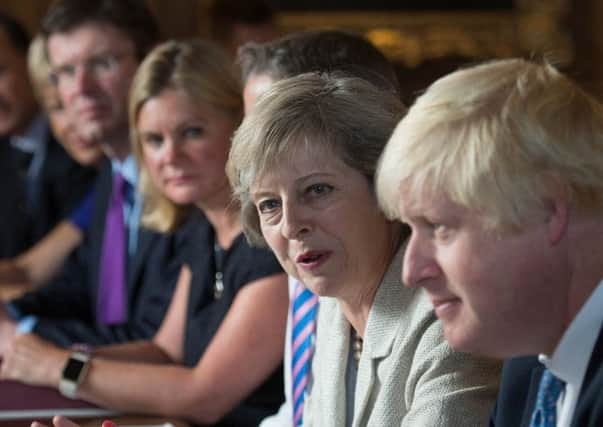May and Sturgeon on collision course over '˜hard Brexit'


Revealing the first details of the government’s strategy for leaving the EU last night, the Prime Minister said the UK government would decide the terms for negotiations with Brussels.
After a day-long Cabinet meeting at the Prime Minister’s Chequers country retreat, Downing Street said ministers had decided the UK would limit EU migration after Brexit, a move that risks forfeiting membership of the common trading area.
Advertisement
Hide AdAdvertisement
Hide AdIn a statement, a spokeswoman for Mrs May said the Cabinet had agreed that “the model we are seeking is one unique to the United Kingdom and not an off the shelf solution”.
She added: “This must mean controls on the numbers of people who come to Britain from Europe but also a positive outcome for those who wish to trade goods and services.”
Downing Street said that a “commitment to the Devolved Nations to make sure that Brexit works for all” was “discussed at length”, but insisted: “Cabinet members were clear that it is the United Kingdom’s government’s decision to establish its terms and on when to trigger Article 50.”
Debate during the EU referendum campaign focused on whether the UK should seek a Norway-style relationship with the EU, providing access to the single market through membership of the European Economic Area, or a looser Swiss-style arrangement governed by a series of treaties.
Both now appear to have been rejected, with the cabinet instead deciding that Brexit negotiators will be sent to Brussels with the more difficult task of hammering out a special deal for the UK.
In a phone call yesterday with Norwegian prime minister Erna Solberg, Mrs May said that upcoming negotiations on the post-Brexit relationship should consider “what is going to work best for the UK and what is going to work for the European Union, rather than necessarily pursuing an existing model”.
David Davis, the cabinet secretary charged with leading the UK’s exit from the EU, has previously said he prefers a free trade deal with the EU from outside the single market similar to the one with Canada now being ratified.
However, the Canadian agreement does not guarantee the rights of financial services companies to operate in the EU, and does not have provisions for the free movement of labour.
Advertisement
Hide AdAdvertisement
Hide AdMrs May was also warned by French President François Hollande during a visit to Paris in July that access to the free market was not possible unless the UK accepted the continued free movement of EU nationals.
Nicola Sturgeon has made continued access to the single market one of the Scottish Government’s key demands. The First Minister maintains that a second independence referendum is “on the table” should Scotland be taken out of the EU.
A spokesman for Ms Sturgeon said the announcement raised questions over whether Scotland’s interests could be protected within the UK.
“The Prime Minister gave the First Minister a very clear undertaking when they met recently that she is prepared to consider options that the Scottish Government puts forward to protect Scotland’s interests,” the spokesman said.
“The simple fact is that it is the Tories that have put Scotland’s interests on the line through a referendum that threatens to take us out of the EU against our will – so the onus is very much on them to show they are serious about safeguarding those interests.
“The people of Scotland will now be watching carefully – is it possible for Scotland’s vital interests to be protected through the UK or are the Tories, through their actions and behaviour, determined to demonstrate they cannot?”
Labour shadow foreign secretary Emily Thornberry claimed the government was guilty of “high-handed arrogance” in its dealings with devolved administrations over Brexit.
Condemning Mrs May’s refusal to give parliament a vote before Article 50 is triggered, Ms Thornberry said: “The country was dragged into this mess by a Tory party acting as a law unto themselves, and now they want to trust us to get them out of it, acting in exactly the same way.
Advertisement
Hide AdAdvertisement
Hide Ad“It is sheer high-handed arrogance for them to say they will take all the decisions themselves, with no consultation of Parliament or the public, with the devolved administrations consulted but not listened to, and with the government of Gibraltar now not even mentioned.”
She added that Brexit should not be triggered until the government has put forward a “clear plan” and devolved administrations including Gibraltar give their approval.
Meanwhile, the cabinet also agreed the slogan for the upcoming Conservative Party conference. Tories will gather in Birmingham next month under the banner “A country that works for everyone”, highlighting what Downing Street said was the “inward looking and divided opposition” offered by Labour.
Conservative Party chairman Patrick McLoughlin told cabinet colleagues the first day of the conference will focus on “global Britain” in an effort to show that the UK remains outward-looking.
Downing Street added: “Ministers agreed that we should be seizing the opportunity of Brexit to confirm the UK’s place as one of the great trading nations in the world, fostering entrepreneurialism and setting out a long term vision for the country.
“They also agreed on the vital need to increase productivity and the importance of doing more to foster economic growth and industrial development in regions up and down the country.”